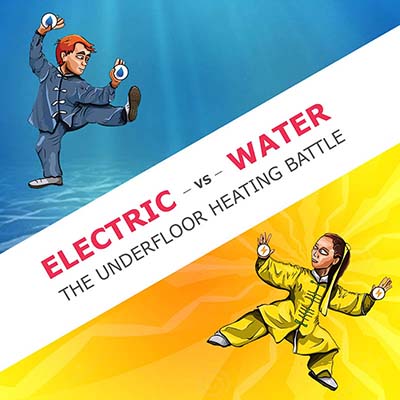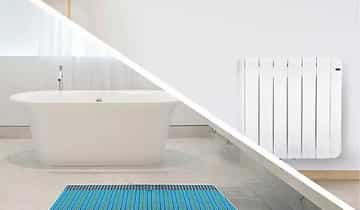5 min read
Why removing insulation from underfloor heating is costing homeowners
I recently asked our wonderful Customer Experience team what were the typical questions asked byhomeownerswhen they called us. Unsurprisingly, one...

As we all know, there are many great benefits for installing underfloor heating but what type of underfloor heating should you choose and for what type of project? This article will hopefully give you the insight you need to make the right decision.
Both electric and water underfloor heating use radiant heat to warm an area from the floor up. It also provides an even distribution of heat throughout any room which increases levels of comfort and reduces energy wastage.
Don’t forget that you also free up wall space which gives you more interior design freedom because there is no longer a need for traditional radiators.
Electric underfloor heating is ideal for both renovations and new builds as it has minimal impact on the height of the floor. Does not create additional loads on existing boiler/plumbing circuits.
Water based underfloor heating is more frequently used in new build projects where the ‘pipework’ is installed in a much thicker layer of screed which can be allowed process and the load can be factored in to the boiler spec/design for in the construction.
Electric underfloor heating is much quicker and easier to install compared with ‘wet systems’. Generally electric systems can be installed in just a few hours (depending on the size of the room) ready for the next stages of floor covering installation. You will need your part P registered electrician to make the connections for you.
Water based underfloor heating takes a lot longer to install. Time needs to be taken to allow for the thick layer of screed to dry and then your chosen floor finish can be laid. Time also needs to be taken to test the pipework with a pressure test ahead of applying the screeds. Primary pipework will also need to be installed to connect to the existing hot water system.
Due to the time it takes to install electric underfloor heating, you can expect significantly less installation costs.
However you will still require a qualified electrician to connect the system to the mains supply.
Water based systems cost a lot more to install because you need to allow for the floor construction build up and screed layers. A qualified plumber will have to install the system and connect it with your boiler – please note your existing boiler may have to be upgraded to cope with the additional load.
Tariff prices can vary which will influence the cost. However, as an example, to run a 2m2 bathroom floor using ThermoSphere electric underfloor heating for a month costs less than the price of the average takeaway coffee. Electricity is also a more sustainable source of power.
Water based systems could be cost effective in the long-term. What could also impact the overall running cost is the maintenance such as annual boiler checks.
Don’t forget that the UK government are looking to ban gas boilers in new builds by 2025 and the trend away from unsustainable sources of energy will impact the costs of gas making it less appealing as an energy source.
The UK clearly has a desire to become ‘greener’ by tackling the inexorable rise in carbon emissions. Philip Hammond outlined new standards “mandating the end of fossil fuel heating systems in new homes from 2025 delivering lower carbon and lower fuel bills too.”
With the increase in use of sustainable energy sources such as electricity via solar panels or wind farms, electric underfloor heating increasingly becomes a very viable and ideal heat source for your home.
If of course your project lends itself to the installation of piped underfloor heating, we have a sustainable source of energy for that – electric boilers!
If you have any questions, don’t hesitate to contact one of our team: 0800 019 5899

5 min read
I recently asked our wonderful Customer Experience team what were the typical questions asked byhomeownerswhen they called us. Unsurprisingly, one...

6 min read
In the latest Home Improvement Trends Report 2022 by Rated People, the perceived value that underfloor heating adds to a home is a whopping £12,290....

6 min read
Without a doubt 2020 was a year of many ups and downs and now with the cooler weather upon us, it is important that we focus on the heating in our...